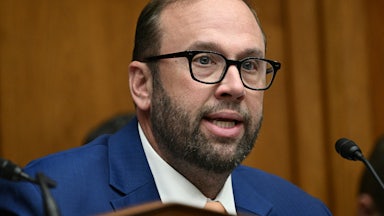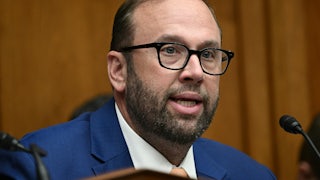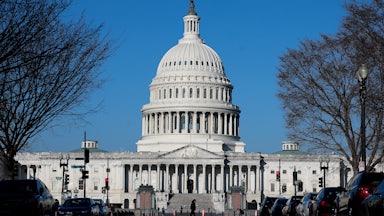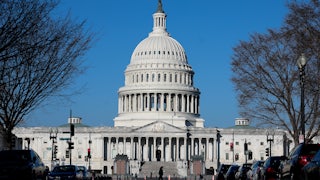It’s June 2023, and the Republican speaker of the House is struggling to appease the hard-line members of his conference, who are angry that he reached a bipartisan deal on government spending levels. A faction of conservatives sink a procedural vote in a rebuke to party leadership.
It’s October 2023, and the Republican speaker of the House is facing an internal revolt from members of his own party furious that he forced passage of a short-term government funding measure to avert a shutdown. Eight GOP representatives, some of them with a personal grudge against the speaker, join all House Democrats in ousting Kevin McCarthy from the post; after three weeks and much intraparty agita, little-known Louisiana Republican Mike Johnson ascends to the position.
It’s January 2024, and the Republican speaker of the House is struggling to appease the hard-line members of his conference, who are angry that he has reached a bipartisan deal on government spending levels. On Wednesday, a faction of conservatives sank a procedural vote in a rebuke to party leadership.
Political observers could be forgiven for developing an acute case of déjà vu. Far-right anger over a government funding agreement, conservative frustration over yet another temporary measure to keep the government funded, and a razor-thin Republican majority in the House: These are the conditions that led to McCarthy losing the gavel last fall. Although most House Republicans believe that Johnson is in a more secure place than his predecessor, the uncertainty surrounding the future of government funding has raised the specter of another speakership fight.
Johnson hashed out a government funding agreement with Senate Majority Leader Chuck Schumer over the weekend, the numbers in line with the deal struck between McCarthy and President Joe Biden last year. Because the deadline to keep the government funded is fast approaching—without congressional action, four agencies will shut down next week, followed by eight additional agencies at the beginning of February—Congress may once again pass a stopgap measure to temporarily avert a shutdown. On Thursday, Schumer started the process for passing a short-term continuing resolution to keep the government open.
But the deal reached with Schumer rests on a shaky foundation. Johnson met with several members of the far-right House Freedom Caucus on Thursday, some of whom left the speaker’s office under the impression that a new deal on government funding would be reached. “It’s not going to be the current deal,” Representative Ralph Norman told reporters. Representative Marjorie Taylor Greene said that Johnson is “going to have to go back to the drawing table.”
However, Johnson himself said that no commitment had been made, raising questions about his ability to communicate effectively with his members. “We had a cross section of members in today, will continue having cross sections of members in, and while those conversations are going on, I’ve made no commitments. So if you hear otherwise, it’s just simply not true,” Johnson said after the meeting.
Representative Mario Diaz-Balart, a top Republican on the House Appropriations Committee, indicated that reneging on the deal with Democrats would undermine Republican credibility. “In this process, the most important thing is your word. And so if you break your word, you can never negotiate anything,” Diaz-Balart told reporters. “Like it or not, we have a top-line agreement.”
Some Senate Republicans were just as dismissive of potential efforts to rewrite the deal. “I don’t believe Speaker Johnson wants to shut down the government. I do know there are people in his party who do. But they’re the same ones who were OK with us not having a speaker for two weeks, so I’m not particularly interested in their strategic advice,” Senator Thom Tillis told reporters. (It was actually around three weeks between McCarthy’s ouster and Johnson’s election as speaker this past October.)
There are several structural factors working against Johnson, not least of which is the extremely narrow majority he’s working with, as well as increasing political polarization. But he may not have been as well equipped as his predecessor to work under these conditions. Unlike McCarthy, Johnson is relatively inexperienced, having been elected to the House in 2016 and only served in a minor leadership role prior to assuming the speakership. He was immediately thrown into the deep end of handling major issues that would be tricky for any party leader. Although Republicans hold the House, Democrats control the White House and Senate, limiting Johnson’s power. Moreover, Biden, Schumer, and Senate Minority Leader Mitch McConnell have served for decades longer than Johnson and are each skilled and experienced negotiators.
GOP Representative Frank Lucas argued that Johnson needed to be forceful with the House Republican conference. “Speaker Johnson has to continue to demonstrate the strength and certainty that is the nature of his personality. This is a body—it doesn’t matter Democrat caucus or Republican conference—if they spot your weaknesses, you’re in a world of hurt,” Lucas said.
Indeed, some House Republicans have warned that Johnson’s job may be in jeopardy if he holds to the current government funding deal—a familiar threat to anyone who remembers McCarthy’s brief tenure as speaker. Representative Chip Roy, who supports a government shutdown if funding is not tied to a hard-line border policy bill, said on CNN that moving to remove Johnson is “not the road I’d prefer,” but added, “We’ll see what happens this week.” Representative Warren Davidson complained this week that Johnson “should never have been hired.”
Greene told reporters on Thursday that ousting Johnson was “absolutely on the table,” and said on Steve Bannon’s podcast that she had “had it” with Johnson’s dealmaking with Senate Democrats. (Earlier this week, Greene said that “Chip Roy haphazardly throwing in a motion to vacate is probably about the dumbest thing that could happen.”)
Still, some Republicans were skeptical that Johnson would face an effort to remove him from the speakership. “It’s a new day, different dynamics. We move on,” said GOP Representative Byron Donalds, explaining that he didn’t think Johnson would face McCarthy’s fate.
Diaz-Balart argued that Johnson still had conservative bona fides, the deal with Schumer notwithstanding, indicating that far-right rabble-rousing might have self-serving motivations. “I think there’s a number of people that will do anything to get on TV, to get to be a celebrity. But the reality is that there’s nobody more conservative than Speaker Johnson in this House,” he said.
Other Republicans just hope that the recalcitrant cadre of conservatives remember the frustration and gridlock that accompanied the previous fight over electing a new speaker. “I am hoping that some of the folks who are on the crankier side see it didn’t really get them anything,” said Representative David Schweikert. “Reality sometimes is that kick in the head.”
Representative Dusty Johnson lumped Democrats in with the few Republicans who voted to oust McCarthy, arguing that members across both parties might be reticent to remove another speaker so soon. “I think many, maybe most of the people who … voted for the disastrous motion to vacate understand how terrible it was and how disruptive it was,” Johnson said. “It took 218 to throw the guy out. I think a big chunk of that 218, as Americans, understand that that made America weaker.”










